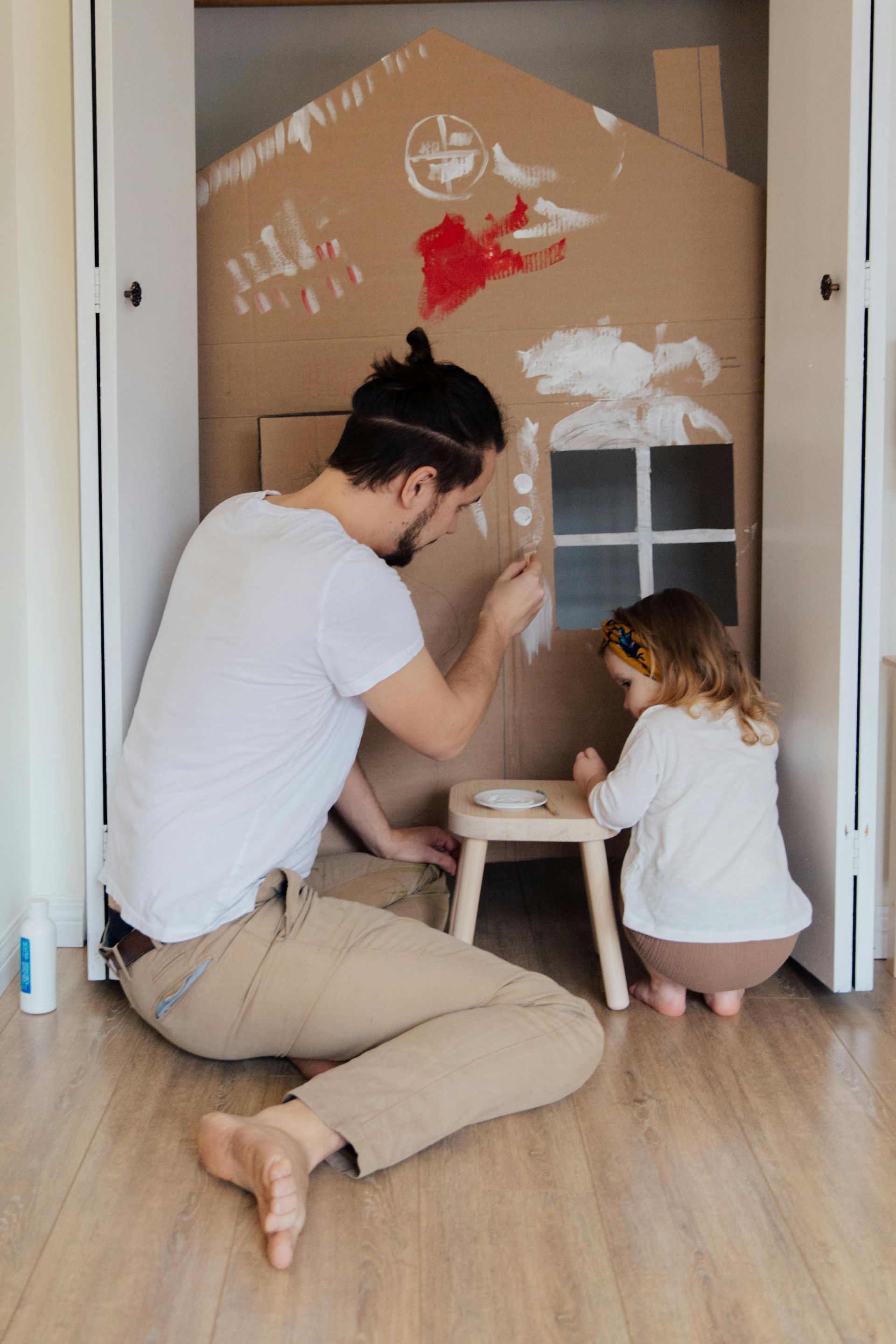Call Us:- 857-928-4104
Blog Layout
How Routines Bring Peace for Sensitive Families
Ceara Deno, MD • December 10, 2024
Schedule A Free Call
How Routines Bring Peace for Sensitive Families

If you’re raising a highly sensitive child, you’ve probably noticed how much they thrive on predictability.
These kids do not like change, newness, or surprises.
Their comfort zone is SMALL.
And they can easily become unhinged when life deals them something unexpected or disappointing.
Why? Why do sensitive kids struggle so much more with unpredictability?
Novelty triggers the threat system in the brain.
For sensitive kids, that threat system is already MORE ACTIVE than other kids.
They notice MORE in their environment, and they are more DEEPLY AFFECTED by the environment.
Not only does the threat system get triggered more easily, it also takes longer to recover back to normal.
This means these children spend a lot of time feeling overwhelmed and on high-alert.
What does this mean for parents of sensitive kids?
It means more meltdowns, power struggles, oppositional behavior, and inflexibility when life is unpredictable.
The good news is creating predictable routines WILL make life easier.
Here are some of the key benefits of predictable routines:
1. Routines Reduce Anxiety
When kids know what’s coming next, it helps them feel safe and secure. A predictable flow eliminates the fear of the unknown, which can often be a source of resistance or anxiety during transitions.
2. They Teach Time Awareness
For many kids, time is an abstract concept. Routines provide structure, helping them understand what to expect and when. Over time, this can build their ability to anticipate and prepare for transitions, reducing meltdowns or frustration.
3. They Create Emotional Safety
Transitions can trigger feelings of uncertainty or overwhelm, especially for sensitive kids. A consistent routine acts like a "roadmap" they can trust, helping them feel emotionally grounded even when moving between activities.
4. They Encourage Independence
When kids become familiar with routines, they start to internalize the steps. This can help them take ownership of transitions, whether it’s tidying up before dinner or getting ready for bed, fostering a sense of competence and independence.
5. They Minimize Power Struggles
When routines are in place, transitions stop feeling like sudden demands and start feeling like a natural flow. This reduces resistance and power struggles, making transitions smoother for both parent and child.
6. They Support Emotional Regulation
Highly sensitive children often need extra time and tools to shift their focus and energy. Routines provide cues that help their nervous system adjust and stay regulated.
7. They Decrease Decision Fatigue for Parents
Without a clear routine, there is no clarity over expectations. Parents are constantly needing to make decisions about what is OK, and all these decisions can become exhausting. Routines give clarity, which decreases the amount of decisions parents need to make.
Would you like support in creating daily routines that fit your unique family? I’d love to help!
The next step is to schedule a Get-Acquainted Call with me using the pink, “Schedule A Free Call” button above.
During this call we will make a plan to create a more peaceful home for you and your sensitive child, full of connection, affection and more joy.
Share
Tweet
Share
Mail

By Ceara Deno, MD
•
February 21, 2025
As parents, it can be very unsettling when children lie to us. While lying is a very normal part of childhood development, there are reasons that highly sensitive children may be more prone to lying. And so we want to look underneath the behavior to better understand why they are struggling to tell the truth. Also, how we respond will make a difference as to whether our child is able to tell the truth in the future.

By Ceara Deno, M.D.
•
February 11, 2025
Have you ever thought, “If only my partner would parent differently, life would be so much easier?” You’re not alone. Parenting differences are incredibly common--and incredibly frustrating. Especially when raising a highly sensitive child. The good news? You don’t have to agree on everything to be an amazing team. Instead of trying to change your partner, try these three strategies to create more harmony: 1️⃣ Get Curious, Not Combative Instead of reacting with frustration, try asking, “Help me understand what's most important to you in this situation?” Your partner has a good reason for what they do as a parent. When we assume good intentions, and seek to understand, we are more likely to get good will and openness in return. Most parenting comes from a place of deep love. When we understand our partner’s heart and thinking, we are more likely to find areas of common ground. 2️⃣ Appreciate the Balance Parenting differences can actually benefit children! Parenting differences can be complementary. Different perspectives makes the family system stronger. Think of the differences like having different types of tools in a toolbox, rather than having a hammer only. With diverse tools, you can fix more things than if you only had a hammer. 3️⃣ Lead by Example The best way to influence your partner’s parenting? Show, don’t tell. When one parent can stay calm during a meltdown, or hold a peaceful boundary—the other partner is way more likely to adopt what works. When children respond positively, your partner will be noticing. Leading by example is incredibly powerful. ****************** Would you love to be on the same parenting page with your partner or coparent? Would you love a more peaceful, connected home? Let’s talk. Together, I’d love to help you and/or your partner break patterns that aren’t serving you and your family. Maybe you’d like to be better at staying calm and not losing your temper. Maybe your partner wants to do this. Maybe you’re fighting with your kids over every little thing. Maybe your preschooler only wants one parent, and you’re not sure how to change this pattern. Whatever the challenge is, I’d love to help create a more peaceful home for you and your family.

By Ceara Deno, MD
•
February 3, 2025
Parents, I see you--beating yourself up. Criticizing your parenting. Feeling like a failure. I get it. I know you have impossibly high standards for yourself. Y ou want to be PERFECT. You want to get it right, the first time, every time, as a parent. I get it. You care so much, and your heart is so big and strong. Then, when you aren’t perfect, which, newsflash, WILL HAPPEN, you make it mean that you’re failing. That you’re not good enough. But this story is NOT THE TRUTH ABOUT YOU AS A PARENT. Yes, you are imperfect. (Like every person to ever exist.) And, yes, you will make mistakes. (Like every person to ever exist.) But you are lovable and perfect in your imperfection, like your child. You are learning and making mistakes, like your child. You deserve compassion and love, like your child. You can learn and grow and change, like your child. ************ If you’re ready to ditch the guilt and shame as a parent, and grow in self-compassion and love, we should chat. I know how easy it is to judge yourself and create a shame story about yourself. But the pressure this creates doesn’t serve you, your child, or your relationship. If you’re ready to ditch the guilt and create more self-compassion, love and connection, I’d love to help. If you’re ready to hold yourself with more gentleness and understanding, let’s schedule a free call together, and create a plan for you to have more peace and connection in your home.

By Ceara Deno, MD
•
January 27, 2025
When you and your child have a blow-up, where there was explosive anger, or you behaved in ways you regret as a parent, it can damage the relationship unless we understand how to repair afterwards.
This involves taking responsibility for our part in the conflict, recommitting to the relationship, and collaborative problem-solving around what we can do differently next time.

By Ceara Deno, MD
•
January 21, 2025
When kids are rude, it’s easy to think they are intentionally trying to be difficult and defiant. But kids are rarely rude for the reasons we think. Instead, rudeness is typically a defense against more vulnerable feelings, like pain and overwhelm. By helping kids open up, we can typically stop rudeness and help them express feelings in healthier ways.

By Ceara Deno, MD
•
January 3, 2025
Defiance can be one of the most challenging behaviors for parents to navigate. When your highly sensitive child digs in their heels or refuses to cooperate, it’s easy to feel frustrated or unsure of what to do. But it’s important to remember that defiance is often a signal that your child is overwhelmed, scared, or struggling to express their needs. Here are 5 tips for handling defiance with your highly sensitive child.

By Ceara Deno, MD
•
December 30, 2024
Highly sensitive kids thrive with a more gentle kind of discipline, rather than traditional strategies like time-outs or threats. Positive discipline teaches kids the skills they need to manage their emotions, make good decisions, and grow into confident, compassionate individuals. By focusing on connection, empathy, and problem-solving, you can guide your highly sensitive child in a way that strengthens your bond and builds their emotional resilience.

By Ceara Deno, MD
•
December 19, 2024
For sensitive families, the holidays can feel like a lot. There can be a lot of overwhelm from the busy schedule, social gatherings, travel and more. If you are feeling stressed as a parent, you are not alone. Here’s what can help lower your stress level and increase your family’s joy during the holidays.

By Ceara Deno, MD
•
December 3, 2024
Mornings can be a especially challenging for families where kids have ADHD or high sensitivity. These kids tend to struggle more with transitions, sensory challenges, power struggles, and difficulties focusing. Here I share practical tips to help your morning routine go more smoothly, with greater connection, peace and cooperation.
MENU
GET IN TOUCH
Subscribe to My Newsletter
Thank you for subscribing to the Sweet Spot Parenting email list. These are resources designed to help Sensitive Families thrive.
Thank you for your interest,
Warmly,
Dr Ceara Deno
Oops, there was an error sending your message.
Please try again later.
Please try again later.
FOLLOW US
© 2025
Sweet Spot Parent Coaching | Privacy Policy


